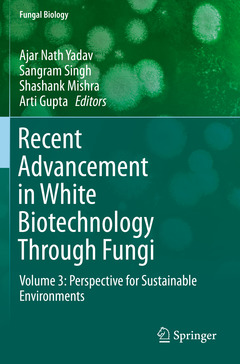Description
Recent Advancement in White Biotechnology Through Fungi, 1st ed. 2019
Volume 3: Perspective for Sustainable Environments
Fungal Biology Series
Coordinators: Yadav Ajar Nath, Singh Sangram, Mishra Shashank, Gupta Arti
Language: English
Subjects for Recent Advancement in White Biotechnology Through Fungi:
Publication date: 10-2020
511 p. · 15.5x23.5 cm · Paperback
Publication date: 10-2019
Support: Print on demand
Description
/li>Contents
/li>Biography
/li>Comment
/li>
Over the last decade considerable progress has been made in white biotechnology research and further major scientific and technological breakthroughs are expected in the future. The first large-scale industrial applications of modern biotechnology have been in the areas of food and animal feed production (agricultural/green biotechnology) and in pharmaceuticals (medical/red biotechnology). In contrast, the productions of bioactive compounds through fermentation or enzymatic conversion are known as industrial or white biotchnology. The fungi are ubiquitous in nature and have been sorted out from different habitats, including extreme environments (high temperature, low temperature, salinity and pH); and associated with plants (Epiphytic, Endophytic and Rhizospheric).
The fungal strains are beneficial as well as harmful for human beings. The beneficial fungal strains may play important roles in the agricultural, industrial, and medical sectors. The fungal strains and itsproduct (enzymes, bioactive compounds, and secondary metabolites) are very useful for industry (e.g., the discovery of penicillin from Penicillium chrysogenum). This discovery was a milestone in the development of white biotechnology as the industrial production of penicillin and antibiotics using fungi moved industrial biotechnology into the modern era, transforming it into a global industrial technology. Since then, white biotechnology has steadily developed and now plays a key role in several industrial sectors providing both high value nutraceutical and pharmaceutical products. The fungal strains and bioactive compounds also play an important role in environmental cleaning. This volume covers the latest research developments related to value-added products in white biotechnology through fungi.
Preface.- Bioremediation: New Prospects for Environmental Cleaning by Fungal Enzymes.- Fungal Enzyme System for Saccharification of Lignocellulosic Feedstocks.- White-Rot Fungi and Their Enzymes for the Treatment of Industrial Dye Effluents.- Fungal Secretomes: Biodegradation Lignocelluloses and Biopolymers.- Fungal Enzymes for Bioremediation of Xenobiotic Compounds.- Pleurotus ostreatus: a Biofactory for Lignin Degrading Enzymes of Diverse Industrial Applications.- Extracellular Fungal Peroxidases and Laccases for Waste Treatment.- Fungal Enzymes for Bioremediation of Contaminated Soil.- Fungal Enzymes for Bioconversion of Lignocellulosic Biomass.- Industrially Important Pigments from Different Groups of Fungi.- Bioconversion of Biomass to Biofuel using Fungal Consortium.- Bioremediation of Polycyclic Aromatic Hydrocarbons Contaminated Soil Through Fungal Community.- Role of Fungi in Climate Change Abatement and Nitrogen Supplement.- Fungal-Phytoremediation of heavy metal contaminated land and water resources.- Biotechnological Applications of β-Glucosidases in Biomass Degradation.- Genetic diversity of methylotrophic yeast and their impact to the environment.- Microbial enzymes and its Application in Pulp and Paper Industry.- Appendixes.- Index.




